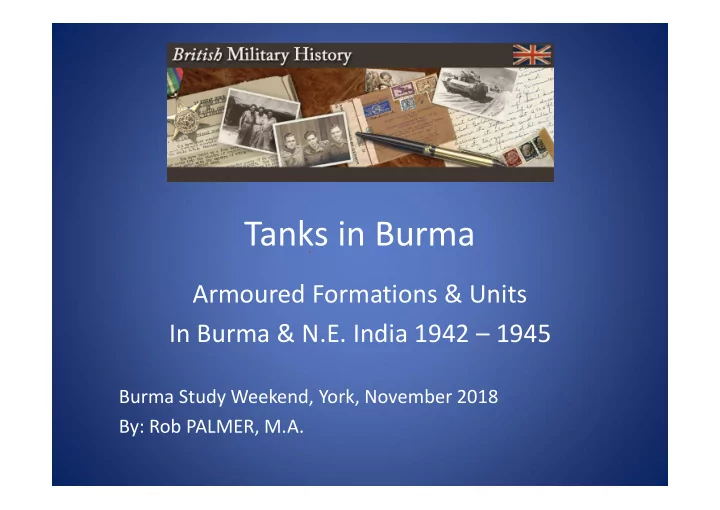

Tanks in Burma Armoured Formations & Units In Burma & N.E. India 1942 � 1945 Burma Study Weekend, York, November 2018 By: Rob PALMER, M.A.
Agenda � Introduction � The Context � 7 Armoured Brigade � First Burma Campaign � The Arakan 1943 � The Battle of the Admin Box � Kohima, Imphal & Nunshigum � 1944 � 45 Campaign including Meiktila � Conclusions
The Second World War � When did it commence? � For U.K. = 3 September 1939 � Only 21 years after end of First World War � Similar narrative to First World War? � May 1940 changed everything � Fall of France � Unexpected � Even by Germany � U.K. decided to fight on � CHURCHILL � Role of Empire (Dominions) crucial � SMUTS
The Far East � Japan annexed Korea in 1910 � Japan with U.K. First World War � Snubbed? � At war with China since July 1937 � U.S. Sanctions � Oil � War Inevitable � to gain resources � oil/rubber � 6 December � Invasion convoy sighted off Malaya � Invaded Malaya six hours BEFORE Pearl Harbor � Hong Kong, Philippines, N.E.I., Burma
The State of Things � India � Third of British Army in India � Indian Army = 21 Cavalry Regiments in 3 Groups � Only armour with R.T.R. companies � Role of Indian Army to reinforce Middle East � No resources for Malaya (Singapore) or Burma � Hong Kong expendable � U.K. not able to fight war against THREE enemies � Bury head in sand � hope it will go away
7 th Armoured Brigade � 7 th Queen � s Own Hussars � 2 nd Royal Tank Regiment � Equipped with Stuart tanks in Egypt � Sent to Malaya, diverted to Burma � 21 February 1942 � Arrived at Rangoon � 24 February 1942 � Prome to lift seige � 19 � 25 April 1942 � Under Chinese command � 31 May 1942 � Reached India with 1 tank
Stuart Tank � 7 th Hussars
7 Armd Bde Route and Actions in Burma
The Arakan � 1943 � Advance down Mayu Peninsula � � C � Sqn, 146 Regiment, R.A.C. (D.W.R.) � Captain De COSTA + 2 Troops � 17 miles walk for Recce � 11.00 1 February 1943 � Attack Commenced � Initially good, then three tanks crashed into ditch � Besa fire � Rescue Attempt � Halted � Bodies of nine crew discovered in 1945 (York)
The Valentine tank
The Battle of the Admin Box � Advance by XV Indian Corps � 25 th Dragoons (Lee tanks) as Corps Troops � Japanese counter-attack surrounds 7 Ind Div � 5 � 23 February 1944 � Admin Box � � B � and � C � Sqns � leaguer at night, attack at day � Supported infantry � Tanks so effective, suicide attacks on them
25 th Dragoons north of Razabil
Kohima � 30 March 1944 � � C � Sqn 150 th Regt R.A.C. to Imphal by air � tanks by land � road cut � 11 April 1944 � Lt. WAIT + 5 Lee tanks up road � 18 April 1944 � 149 th Regt, R.A.C. to Kohima � � B � Sqn � Major Ezra RHODES � 28 April � Attempt to get up to D.C � s Bungalow � 6 May � Lee tank slid off ridge down slope � 13 May � Tennis Court � Sjt WATERHOUSE
Memorial at Kohima
Imphal & Nunshigum � 3 rd Carabiniers (Lee tanks) � Imphal � 30 March 1944 � � C � Sqn 150 th Regt R.A.C. to Imphal by air � tanks by land � road cut � Lots of actions but � . Nunshigum � 13 April � � B � Sqn supporting 1 st Bn. 17 th Dogras � Hill over 1,000 feet above plain. Two troops � Major SANFORD, Lts NEALE & FITZHERBERT, Sqn Q.M. Sjt BRANSTON, Sjt DOE & Cpl HUBBARD � Sqn Sjt-Major CRADDOCK led final attack
Nunshigum & Imphal
Looking North to Twin Bumps
The Pimple or Northern Bump
The Highest Tank on Kennedy Peak
Extended Capital - Meiktila The Masterstroke � 17 Indian Division & 255 Indian Armoured Brigade crossed the Irrawaddy River and struck out for the garrison town of Meiktila � 23 February � Armoured Column at Taungtha � 2 March � Airfield captured � Aggressive defence by armoured columns � 30 March � Japanese defeated � To Rangoon!
Sherman Tanks advancing on Meiktila
Which is Faster?
XV Indian Corps - Arakan � 50 Indian Tank Brigade � Limited use, Squadrons only � Ramree Island � Myebon Peninsula & Kangaw � Taungup � Lt. Archie GWATKIN and Lt. John SKINNER
The M3 General Lee
Operating Practices � Tanks used in small units � Squadrons � Intention to support infantry � All force (ground + air) battle groups � effective � Role of Forward Tank Officer (F.T.O.) Role of the 4 th Bombay Grenadiers � � Japanese counter-measures not effective � Reliant on individual bravery by soldiers � MESSERVY was proved right
The GWATKIN Brothers
Proud Father & Two Sons
Conclusions � Armour played a significant role in the campaigns fought in Burma and N. E. India � Role is often neglected, not understood � New techniques developed � All arms battlegroups � Role of R.E., I.E.M.E., R.I.A.S.C., I.A.O.C., etc also overlooked, but without them � .? � There is more to the Second World War than Dunkirk, D-Day, Arnhem & Bomber Command
Thank you! Rob Palmer www.BritishMilitaryHistory.co.uk
Recommend
More recommend